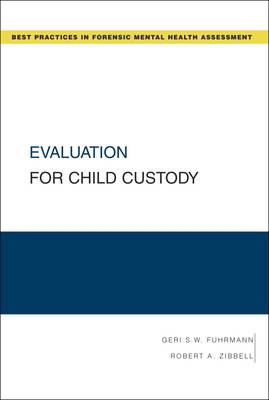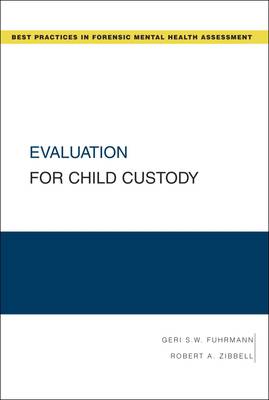
- Retrait gratuit dans votre magasin Club
- 7.000.000 titres dans notre catalogue
- Payer en toute sécurité
- Toujours un magasin près de chez vous
- Retrait gratuit dans votre magasin Club
- 7.000.0000 titres dans notre catalogue
- Payer en toute sécurité
- Toujours un magasin près de chez vous
Description
Forensic mental health assessment (FMHA) has grown into a specialization informed by research and professional guidelines. This series presents up-to-date information on the most important and frequently conducted forms of FMHA. The 19 topical volumes address best approaches to practice for particular types of evaluation in the criminal, civil, and juvenile/family areas. Each volume contains a thorough discussion of the relevant legal and psychological concepts, followed by a step-by-step description of the assessment process from preparing for the evaluation to writing the report and testifying in court. Volumes include the following helpful features:
- Boxes that zero in on important information for use in evaluations
- Tips for best practice and cautions against common pitfalls
- Highlighting of relevant case law and statutes
- Separate list of assessment tools for easy reference
- Helpful glossary of key terms for the particular topic In making recommendations for best practice, authors consider empirical support, legal relevance, and consistency with ethical and professional standards. These volumes offer invaluable guidance for anyone involved in conducting or using forensic evaluations. Child custody cases represent one of the most complex areas of forensic mental health assessment. The evaluations are highly specialized, requiring expertise in child development and psychopathology and a thorough understanding of the professional and ethical guidelines for child custody evaluations. This volume, written by two child custody examiners with years of experience and an exceptional depth of understanding of the area, synthesizes the highest quality of work in the field to articulate the best practices for these evaluations based upon professional guidelines, law, and research.
- Boxes that zero in on important information for use in evaluations
- Tips for best practice and cautions against common pitfalls
- Highlighting of relevant case law and statutes
- Separate list of assessment tools for easy reference
- Helpful glossary of key terms for the particular topic In making recommendations for best practice, authors consider empirical support, legal relevance, and consistency with ethical and professional standards. These volumes offer invaluable guidance for anyone involved in conducting or using forensic evaluations. Child custody cases represent one of the most complex areas of forensic mental health assessment. The evaluations are highly specialized, requiring expertise in child development and psychopathology and a thorough understanding of the professional and ethical guidelines for child custody evaluations. This volume, written by two child custody examiners with years of experience and an exceptional depth of understanding of the area, synthesizes the highest quality of work in the field to articulate the best practices for these evaluations based upon professional guidelines, law, and research.
Spécifications
Parties prenantes
- Auteur(s) :
- Editeur:
Contenu
- Nombre de pages :
- 288
- Langue:
- Anglais
- Collection :
Caractéristiques
- EAN:
- 9780195329513
- Date de parution :
- 14-11-11
- Format:
- Livre broché
- Format numérique:
- Trade paperback (VS)
- Dimensions :
- 140 mm x 216 mm
- Poids :
- 335 g

Les avis
Nous publions uniquement les avis qui respectent les conditions requises. Consultez nos conditions pour les avis.






